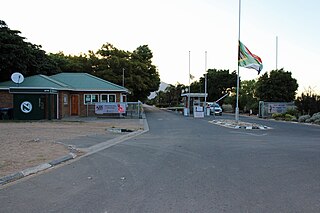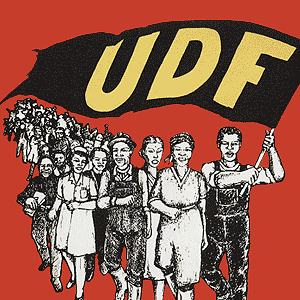Related Research Articles

The Congress of South African Trade Unions is a trade union federation in South Africa. It was founded in 1985 and is the largest of the country's three main trade union federations, with 21 affiliated trade unions.

Ahmed Mohamed Kathrada OMSG, sometimes known by the nickname "Kathy", was a South African politician and anti-apartheid activist.

Drakenstein Correctional Centre is a low-security prison between Paarl and Franschhoek, on the R301 road 5 km from the R45 Huguenot Road, in the valley of the Dwars River in the Western Cape of South Africa. The prison is the location where Nelson Mandela spent the last part of his imprisonment for campaigning against apartheid.
Ray Alexander Simons (née Alexandrowich; was a South African communist, anti-apartheid activist, campaigner and trade unionist who helped draft the Women's Charter. She moved to Cape Town in 1929 to escape the persecution of Jews and communists.

The United Democratic Front (UDF) was a South African popular front that existed from 1983 to 1991. The UDF comprised more than 400 public organizations including trade unions, students' unions, women's and parachurch organizations. The UDF's goal was to establish a "non-racial, united South Africa in which segregation is abolished and in which society is freed from institutional and systematic racism." Its slogan was "UDF Unites, Apartheid Divides." The Front was established in 1983 to oppose the introduction of the Tricameral Parliament by the white-dominated National Party government, and dissolved in 1991 during the early stages of the transition to democracy.

Gugulethu is a township in the Western Cape, South Africa and is 15 km from Cape Town. Its name is a contraction of igugu lethu, which is Xhosa for our pride. The township was established along with Nyanga in the 1960s.
The National Union of South African Students (NUSAS) was an important force for liberalism and later radicalism in South African student anti-apartheid politics. Its mottos included non-racialism and non-sexism.

Crossroads is a high-density township in the Western Cape, South Africa.

Manenberg is a township of Cape Town, South Africa, that was created by the apartheid government for low-income Coloured families in the Cape Flats in 1966 as a result of the forced removal campaign by the National Party. It has an estimated population of 52,000 residents. The area consists of rows of semi-detached houses and project-like flats, known as "korre". The township is located about 20 km away from the city centre of Cape Town. It is separated from neighbouring Nyanga and Gugulethu townships by a railway line to the east and from Hanover Park by the Sand Industria industrial park to the west and Heideveld to the north. The northern part of Manenberg has wealthy people that are mostly Muslims. The rest of Manenberg has poor people that are mostly associated with Christianity.

The Federation of South African Trade Unions (FOSATU) was a trade union federation in South Africa.
The Little Rivonia Trial was a South African apartheid-era court case in which several members of the armed resistance organization Umkhonto we Sizwe faced charges of sabotage. The accused were: Laloo Chiba, Dave Kitson, Mac Maharaj, John Matthews and Wilton Mkwayi. A confederate of theirs, Lionel Gay turned state witness, and in return, the prosecution dropped the charges against him.

The Rand Rebellion was an armed uprising of white miners in the Witwatersrand region of South Africa, in March 1922. Jimmy Green, a prominent politician in the Labour Party, was one of the leaders of the strike.

Internal resistance to apartheid in South Africa originated from several independent sectors of South African society and took forms ranging from social movements and passive resistance to guerrilla warfare. Mass action against the ruling National Party (NP) government, coupled with South Africa's growing international isolation and economic sanctions, were instrumental in leading to negotiations to end apartheid, which began formally in 1990 and ended with South Africa's first multiracial elections under a universal franchise in 1994.
Elizabeth Adriana Abrahams was a South African political activist and trade unionist who participated actively in the struggle against apartheid. Born in the Paarl Valley area of Western Cape Province, South Africa, she became General Secretary of the Food and Canning Workers Union (FCWU) in 1956, a duty she performed until 1964. Her commitment to the struggle brought her close to activists including Elizabeth Mafikeng, Archie Sibeko, Oscar Mpetha and Ray Alexander. She was in 1986 detained for police questioning and subsequently detained for almost three months without trial. After her retirement, Abrahams remained actively involved in the Food and Allied Workers Union (FAWU), and was in 1995, a year after South Africa's first democratic elections, invited to serve as a Member of Parliament. During the last years of her life, Abrahams received several awards for her contributions to the liberation movement and for her activities on behalf of the rights of the working class.
Zollie Malindi was a South African trade unionist and anti-apartheid activist. His life journey started in the small village of Gqogqora, near Tsomo in the former Transkei. While growing up, Zollie became aware of racial segregation. Years later, after completing his Teaching Training Diploma, he set off to look for work in Cape Town; but in those days it was not easy for an African male to find employment even with a professional's qualification. Zollie became actively involved in the African National Party (ANC) and the South African Communist Party (SACP) in the 1940s. As members of the ANC were encouraged to join unions, in no time, Zollie joined the Food and Canning Workers Union (FAWU) where he met political leaders like Oscar Mpetha and Ray Alexander. Zollie was a dedicated man and a powerful leader with a commanding presence and a high degree of responsibility. At the time of the ANC's banning in 1960, Malindi was the Western Cape Provincial President. Following the passage of the 90-day detention laws in 1963, Malindi was arrested and detained together with Looksmart Ngudle, who was the first person to die in detention. In the years after his detention, Zollie became even more involved in the fight against apartheid and subsequently became a mentor to the younger generation of political activists that included well-known political figures such as former Minister of Finance Trevor Manuel. After the 1994 elections, Zollie continued working as a member of the ANC, but his declining health forced him to retire alongside his wife, activist Letitia Malindi. A day after his death in 2008, Zollie Malindi was awarded the Order of Luthuli in silver by former South African president Thabo Mbeki in recognition of his contribution to the trade union movement.
The Food and Canning Workers' Union (FCWU) was a trade union representing food processing workers in South Africa. Its members were mainly based in the Western and Eastern Cape. It was affiliate with the African Food and Canning Workers' Union (AFCWU).
Fezeka High School is a public high school located in Gugulethu, Western Cape, South Africa. It is one of the high schools in the City of Cape Town Metropolitan Municipality.

The Agricultural Food and Allied Democratic Workers Union (AFADWU) is a trade union representing food processing workers in South Africa.
Mandu Mildred Ramakaba-Lesiea is a South African politician and veteran of the African National Congress (ANC), which she joined in 1954. After the end of apartheid in 1994, she represented the ANC in the National Assembly from 1998 to 2004.
Muzivukile Curnick Ndlovu, also spelled Muzuvukile, was a South African politician, anti-apartheid activist, and trade unionist. A veteran of the African National Congress, he represented the party in the National Assembly during the first democratic Parliament from 1994 to 1999. He was also a former national chairperson of the United Democratic Front, a former secretary of the Railway and Harbour Workers' Union, and a former regional commander of Umkhonto we Sizwe (MK) in Natal Province.
References
- ↑ "Oscar Mpetha". South African History on line. Retrieved 24 January 2016.
- ↑ "Oscar Mafakafaka Mpetha". Encyclopædia Britannica. Retrieved 24 January 2016.
- ↑ https://www.sahistory.org.za/sites/default/files/united_democratic_front_udf_general_information.pdf [ bare URL PDF ]
- ↑ "Oscar Mpetha". Food and Allied Workers Union. Retrieved 26 January 2016.
- ↑ "Oscar Mpetha". www.fawu.org.za. Archived from the original on 24 August 2018.
- ↑ https://www.sahistory.org.za/sites/default/files/united_democratic_front_udf_general_information.pdf [ bare URL PDF ]
- ↑ "Oscar Mpetha". www.fawu.org.za. Archived from the original on 24 August 2018.
- ↑ http://sas-space.sas.ac.uk/4176/1/Iris_Berger_-_Creating_solidarity,_food_and_canning_workers_at_the_cape_1940-60.pdf [ bare URL PDF ]
- ↑ "United Democratic Front (UDF) - The O'Malley Archives". omalley.nelsonmandela.org. Retrieved 21 June 2021.
- ↑ "Oscar Mpetha, Ally of Mandela And Labor Union Organizer, 85". New York Times. 21 November 1994. Retrieved 25 January 2016.
- ↑ "Oscar Mpetha". South African History on line. Retrieved 24 January 2016.